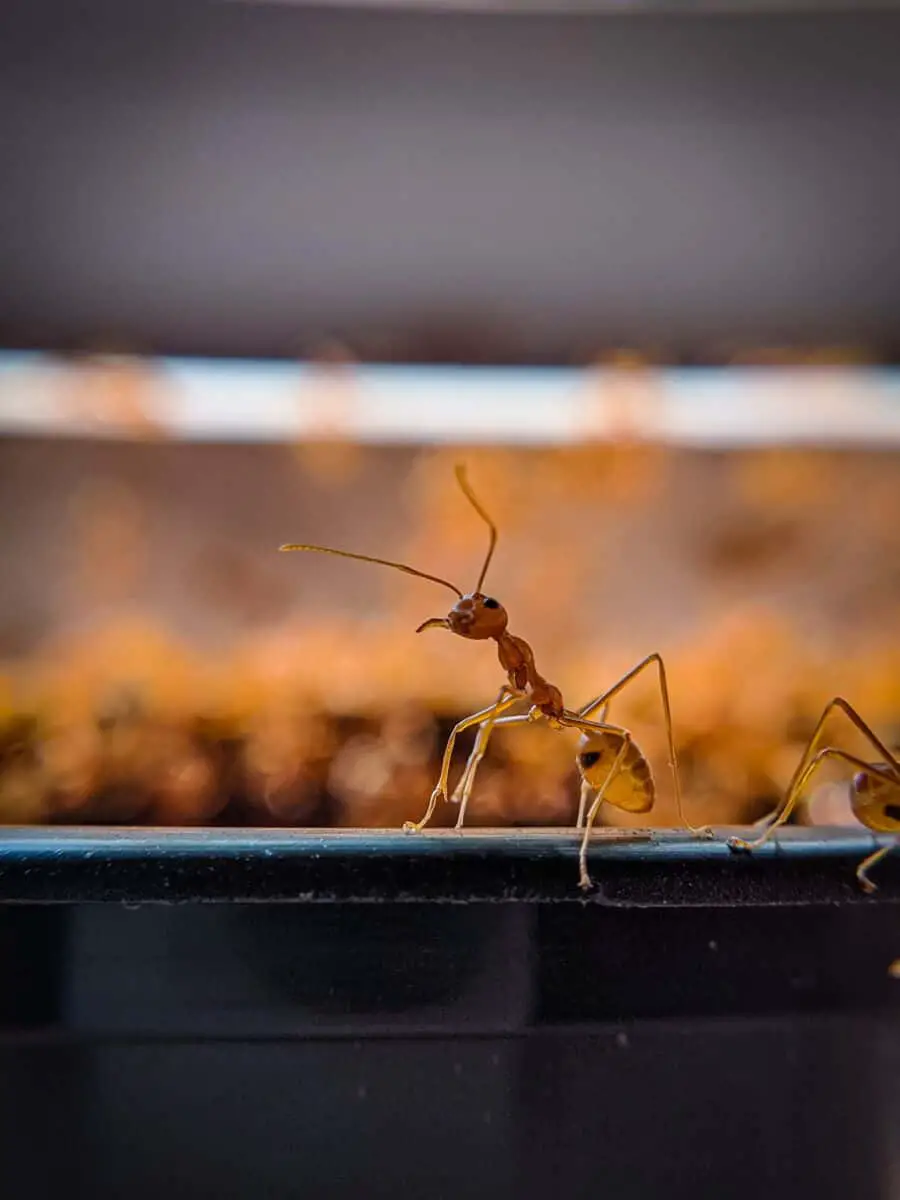Ants on your balcony can ruin your whole enjoyment of an area of your home. It may start as one or two, but if left unchecked, you can end up with an entire army. Therefore, you’ll want to know how to get rid of ants on your balcony.
To get rid of ants on your balcony, try a Borax-sugar mix. Use it either on its own or dissolved in water. Essential oils like peppermint, orange, and cinnamon are also effective ant killers. You should also ensure you keep your balcony clean and don’t leave food and water on it.
Getting rid of ants on your balcony isn’t rocket science, and doesn’t have to be costly. There are several things you can try by using a few simple ingredients. You can read more detail on the best solutions below.
Make a Sugar and Borax Bait
This method of getting rid of your ant problem is handy as it uses Borax, a household product that you may already have.
If not, it’s easy to get a hold of and inexpensive. For example, Borax 20 Mule Team Detergent Booster works out at only 7 cents per ounce.
There are two ways to use Borax to kill ants. The first is by mixing one cup of sugar and two tablespoons of Borax. Mix them thoroughly to disguise the Borax in the sugar, as it’s the sugar that will attract the ants.
You can put this mixture in a dish or scatter it on your balcony floor or other surfaces.
The second way to use Borax is by dissolving the same mixture mentioned in boiling water and stirring well. Dip cotton wool balls in it and leave on the affected surfaces.
Whichever method you choose, leave it on the surface. The ants will find it because of the sugar content and will start eating it.
When the ants ingest the Borax-sugar mixture, the Borax disrupts their digestive system.
It eventually kills them, but not before they’ve taken it back to the nest where other ants will feed on it. You’ll kill ants without having to track the nest.
This timelapse video shows the liquid method in action. It demonstrates how quickly you might achieve results:
You can play around with the mixture to find what works for you, as there are no hard and fast rules. Keep trying until you find the proportions that will work on your ant problem.
Use Peppermint Essential Oil Spray or Undiluted
Another means of killing or reducing ant activity is through the use of essential oils.
One way that ants communicate with each other is by secreting chemicals called pheromones. As explained in the video below, ants follow the pheromone trail that the lead ant is leaving behind:
Strong odors can disrupt this means of communication by breaking the pheromone trail. So, even if some ants make it to your balcony, others won’t follow.
Try diluting peppermint oil to use as a spray-on for surfaces like walls, floors, or tables. A suggested mix is two to three tablespoons of peppermint oil to one quart of water.
A study published in 2019 found that peppermint oil was also effective in killing fire ants. This is useful if you’ve found the ant nest.
In the first part of this video, you’ll see how effective undiluted peppermint oil is if applied directly to a nest:
But be cautious if you use essential oils as they are toxic to cats and dogs. These oils can also cause skin irritations. Make sure that you keep pets and children away from the area.
Use Orange Essential Oil Spray
A 2002 study found that orange oil was an effective treatment when used to drench ant nests. It reduced ant activity almost as effectively as a commercial insecticide, diazinon.
In this video, a high concentration of an ounce and a half of orange oil in one gallon of water killed off a fire ant colony in a couple of hours:
You can buy orange oil like this Medina Orange Oil and make your mixture. You can experiment with different dilutions to find what works best.
Orange oil is toxic to pets, but you can buy a commercial solution like Orange Guard 101 Home Pest Control. This says it’s safe for use around pets. So, it’s a better option if you’re worried about them straying into treated areas.
Cinnamon Essential Oil or Cinnamon Powder
A study published in 2014 used cinnamon oil at various concentrations mixed with heated paraffin wax and coated on paper. The study concluded that cinnamon oil at a 20% concentration was an effective ant killer.
Cinnamon powder also acts as an ant deterrent. The ants in the video avoided crossing a cinnamon trail, even when there was a food source beyond it:
If you don’t want to leave trails of cinnamon powder on your balcony floor, try a barrier of cinnamon sticks. Bundle them up and make them a decorative feature.
Spray Surfaces with White Vinegar Solution
The 2019 peppermint oil study also tested the effectiveness of vinegar on fire ants. It found that while it wasn’t effective in killing ants, its odor was a decent temporary deterrent. The odor interfered with the ants’ pheromones, causing disorientation.
Try a solution of equal parts of water and vinegar. Spray both the outer and inner facing surfaces and the top of balcony walls. Since vinegar evaporates, you’ll need to spray frequently to maintain protection.
Remove Food Sources
Once you’ve killed off the ants, you won’t want them returning.
As with most pest problems, the foundation for success is cleanliness. So, make sure you clean up and don’t leave food lying around on your balcony.
Ants are omnivores, so they’ll eat almost anything. Around your home, depending on species, you’ll find them snacking away on sweet and sticky treats, as well as fatty and greasy food.
Avoid keeping any food or drink out on your balcony, whether it’s human, pet, or bird food. Even food remnants on plates or pet food bowls will attract ants, so clear them away.
Also, ensure you clean up any food and drink spillages as soon as possible. And sweep the whole area regularly, moving any obstructions to make sure you don’t miss any crumbs.
Keep Your Balcony Plants Aphid-free
Plants give a balcony a welcoming feel and add color. Aphid ridden plants are like an ant cafe.
Aphids produce honeydew, and ants just love to feed on it. So much so that the ants will protect the aphids from predators.
If you find aphids on your balcony plants, the treatment is straightforward and inexpensive.
Just make up a solution of soapy water and spray the affected plants. It may take several applications to deal with the problem, but keep going until the aphids are gone.
Trim Back Plants and Trees that Touch Your Balcony
If you have plants or trees brushing up against or climbing up on your balcony, cut them back. Otherwise, they’ll act as a bridge, allowing ants to cross onto your balcony.
Use Plants on Your Balcony That Repel Ants
Not all plants are bad when you’re trying to get rid of ants on your balcony. In fact, some are natural ant deterrents.
A balcony is an ideal spot for container plants. A few plants that ants hate include tansy, lavender, and rosemary.
Tansy is harmful to pets and humans. So if you want to avoid it, some alternatives are pennyroyal, mint, and thyme.
Conclusion
As you’ve seen, there are several ways to get rid of ants on your balcony.
The best way to tackle the problem is to kill off the colony. Use Borax-sugar bait or essential oils applied directly to the nest.
Once you’ve done that, you must follow it up with the other steps. Remove all food and water sources and cut plants that may provide access points.
These and the other steps discussed will help ensure there will be no more ants on your balcony.

